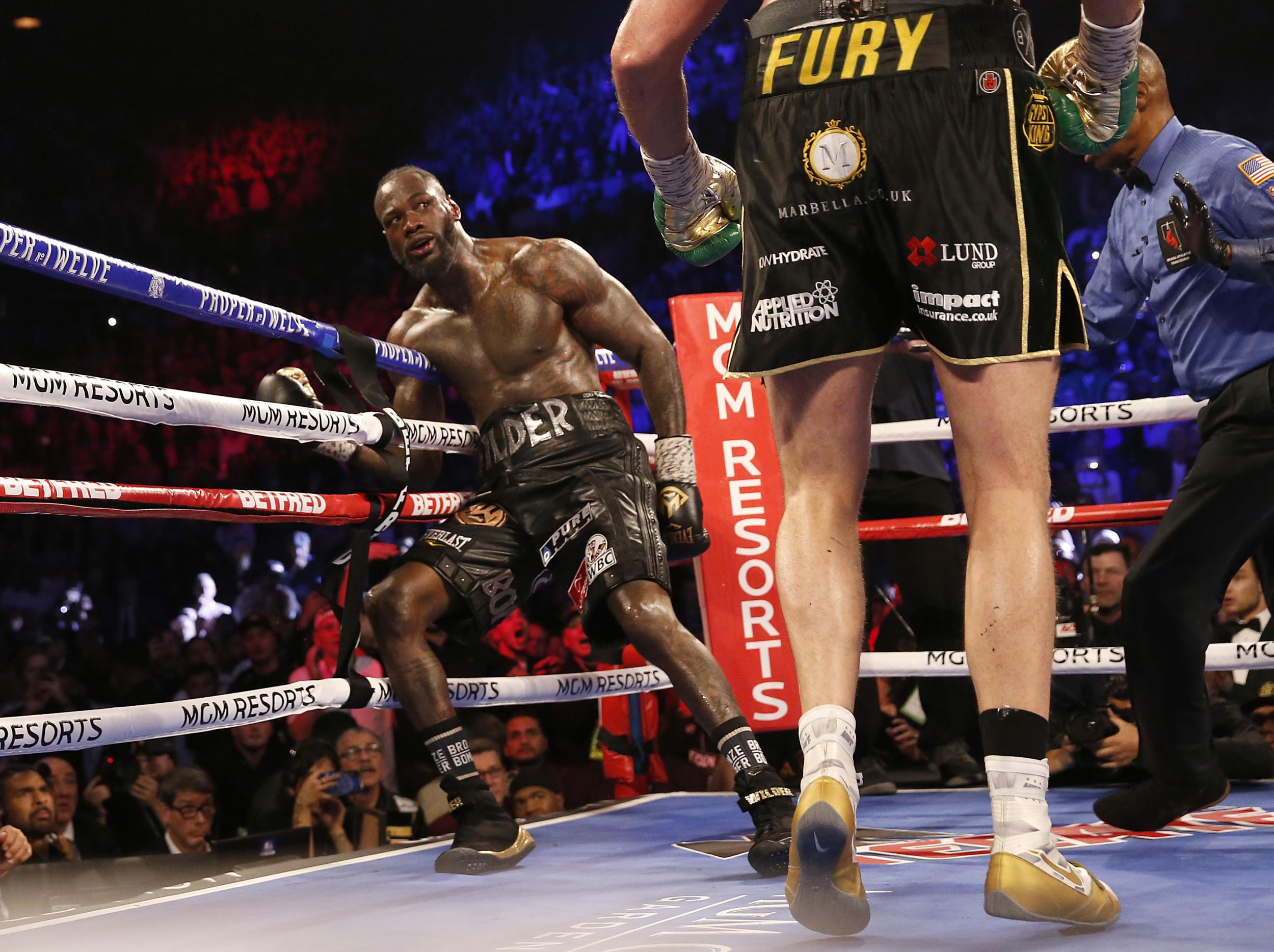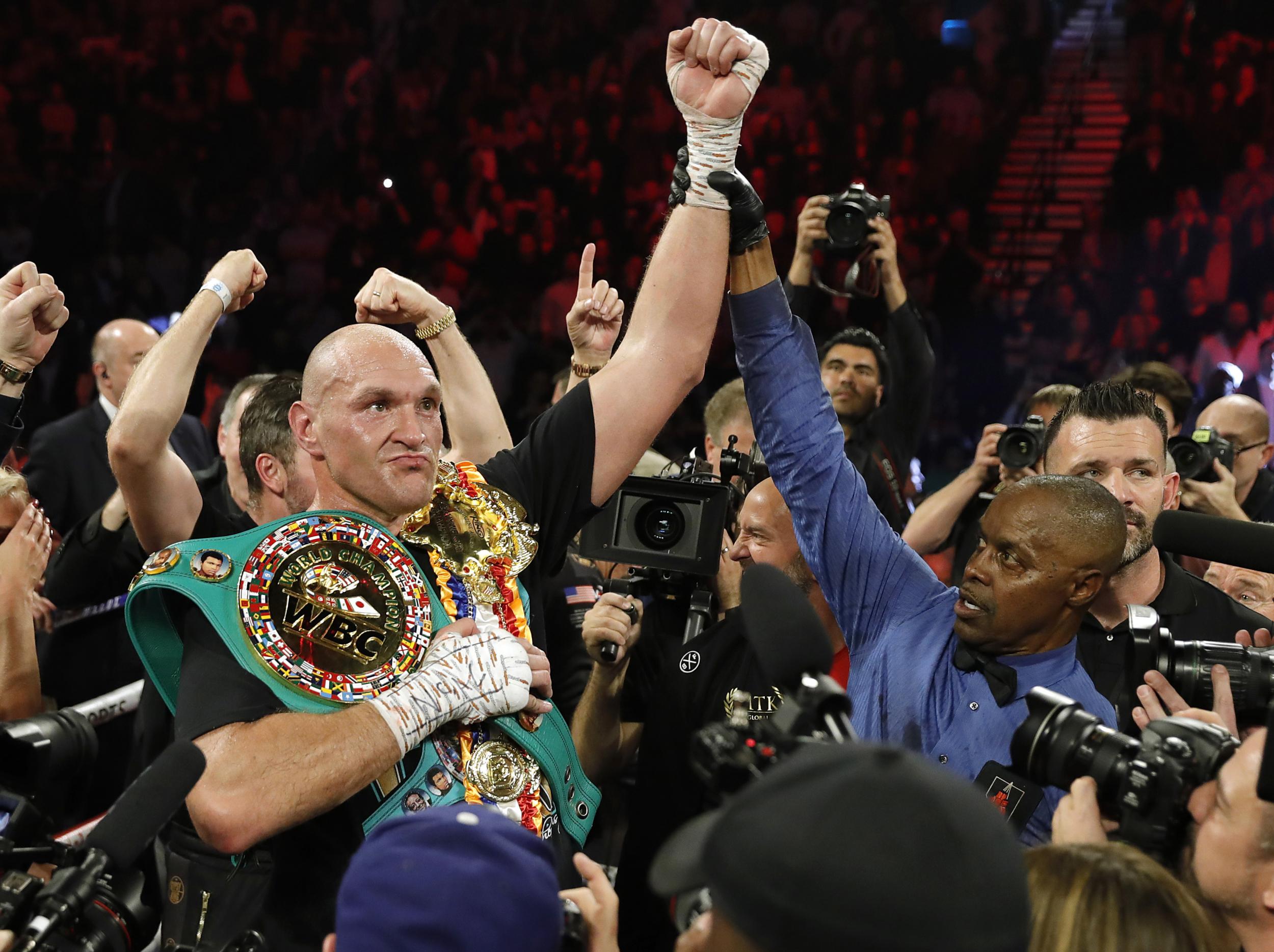Tyson Fury stops Deontay Wilder to become world heavyweight champion for second time
Fury produced the most accomplished performance of his incredible career to dethrone Wilder and become the heavyweight champion of the world for a second time
Your support helps us to tell the story
From reproductive rights to climate change to Big Tech, The Independent is on the ground when the story is developing. Whether it's investigating the financials of Elon Musk's pro-Trump PAC or producing our latest documentary, 'The A Word', which shines a light on the American women fighting for reproductive rights, we know how important it is to parse out the facts from the messaging.
At such a critical moment in US history, we need reporters on the ground. Your donation allows us to keep sending journalists to speak to both sides of the story.
The Independent is trusted by Americans across the entire political spectrum. And unlike many other quality news outlets, we choose not to lock Americans out of our reporting and analysis with paywalls. We believe quality journalism should be available to everyone, paid for by those who can afford it.
Your support makes all the difference.It is testament to the sheer amount of entertaining nonsense that Tyson Fury has garbled down the years that, when he began breathlessly proselytising he was going to stop Deontay Wilder in Las Vegas, precious few people believed him. How silly we all look now. On an utterly unforgettable night of boxing Fury was true to his word and then some, producing the most skilfully destructive performance of his career to become heavyweight champion of the world for a second time.
His emphatic victory completes one of the greatest comebacks in modern sports history. Prior to his first fight with Wilder, which ended in a fragrantly unfair split decision draw, Fury ballooned up to 27 stone. He sunk sixteen pints of Stella a day. He battled an addiction to cocaine. And, most fatefully of all, he climbed into a sports car and came perilously close to driving into a bridge to kill himself. Now, he is the WBC champion and the first man ever to defeat Wilder.
But the facts pale in comparison to the nature of this victory, which must surely rank as one of the finest in British boxing history. Fury — whose ascent to the summit of his sport had largely been down to his unorthodox, inherently defensive style — completely changed his gameplan for this rematch, replacing the young trainer Ben Davison with SugarHill Steward of the Kronk Gym and boldly seeking the knockout from the very start. He dropped Wilder in the third and fifth, before the American’s corner threw in the towel in the seventh.
Despite Wilder’s predictable post-fight protestations, it was the correct decision. He ended the fight dazed and disorientated, with rivets of blood gushing from his ear, stripped of the WBC title that he so cherished. He has been a fine champion and the green belt has a storied lineage: Sonny Liston, Muhammad Ali, Joe Frazier, George Foreman, Ken Norton, Mike Tyson, Larry Holmes, Evander Holyfield, Lennox Lewis, Wilder. And now Fury.
The dramatic outrageousness of his achievement was not lost on him. “I talk like this because I can back it up,” he crowed immediately after his victory. “People write me off, they look at my fat belly and my bald head and they think that I cannot fight. But he fought the best Tyson Fury tonight, we are both in our primes. We trained for a knockout and I’m a man of my word.”
That this was going to be a memorable evening was evident from the moment Fury, dressed in a regal red robe and golden crown, was carried to the ring by a troop of Xena the Warrior Princess lookalikes, to the unlikely strains of Patsy Cline’s mournful classic Crazy. But his sangfroid entrance was misleading. Because, from the very first bell, Fury threw caution to the wind in pursuit of a big finish.
The opening round set the tone. Wilder immediately began circling to his left, hoping to unload his boomerang of a right hand, but he seemed slower and more cumbersome than usual, clearly struggling to adjust to the extra weight he had piled on for the contest. In contrast, Fury had lost none of his sprightliness despite gaining 16.5lbs since the Los Angeles draw, and began dodging shots and returning with stiff jabs.
It was in the third round that this fight sparked into life. Fury grew in confidence and began sitting down on his shots, landing with a jab and right hand combination similar to that relied upon by Wilder to dominate this division for so long. He struck Wilder clean in the temple, with the American sinking to the canvas for the first time in almost ten years, when he was clipped by the unheralded journeyman Harold Sconiers in only his thirteenth fight.
Wilder would come back to win that early contest by way of knockout. But he failed to recover his poise here. He was quickly back on the canvas — although referee Kenny Bayless rather charitably ruled his fall a slip — and he started the fourth round on legs so wobbly that they would make a drunk seem steady.
With his long arms flailing in front of him like a man wading through bulrushes, Wilder was in desperately deep waters and he was felled for a second time in the fifth. This time Fury went to the body, winging in a spiteful left hook that struck his opponent directly in the kidney. Once again he scrambled quickly to his feet but the writing was on the wall, and Bayless began hovering ominously close.
The end came in the seventh. Wilder had long since resorted to relying solely upon his trademark right hand to an almost tragicomic degree, only for Fury to duck it with ease. After yet another wild swing and a miss Fury pounced, uncorking a straight right directly down the pipe which sent Wilder sprawling back into the turnbuckle. The American’s corner had seen enough and the towel came in. To the limey delight of the hundreds of well-oiled Brits in attendance, his five-year stint as world champion was finally over.

“My side threw in the towel but I was ready to go out on my shield,” a dazed Wilder protested afterwards. “I had a lot of things going on coming into this fight. I make no excuse, I wish my corner let me go out on my shield. No excuses, I will come back and be stronger.
“But even the greatest lose, that’s part of it. You take it for what it is. I had a lot of complications, we’ll come back even stronger. This is what heavyweight boxing is all about. I hope everyone at home enjoyed the fight. Thank you for coming out.”
As ever, thoughts quickly turned to what — and who — would be next. Wilder confirmed he wanted another rematch and, once back in his dressing room, Fury floated the idea that a third fight between the pair could take place at the new Oakland Raiders stadium just down the road.

There are other options, however. Eddie Hearn, the promoter of WBA, IBF, WBO and IBO champion Anthony Joshua, wasted no time in telling Fury on Twitter that there was “no need for a third”, while WBC mandatory Dillian Whyte also used his social media profile to flex his muscles and advance his case for a summer showdown.
In the meantime, debate will now swirl over exactly where Fury ranks among the pantheon of British greats. For many, this victory will elevate him above the likes of Joe Calzaghe, Lennox Lewis and Randolph Turpin. That would leave only the black-and-white pre-war legends — men like John Broughton, Ted Lewis and Bob Fitzsimmons. This was a stunning night for British sport, and a stunning night for Tyson Fury.
Join our commenting forum
Join thought-provoking conversations, follow other Independent readers and see their replies
Comments